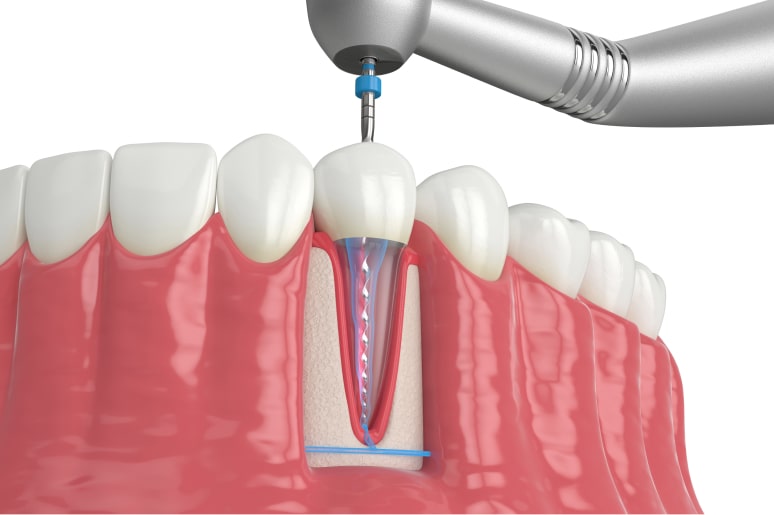Root Canal Therapy
Root Canal Therapy
Symptoms of tooth pulp damage or disease
A diseased tooth pulp may cause inflammation or infection. The symptoms of a damaged or diseased tooth pulp may include:
- unprovoked or spontaneous pain
- sensitivity to hot and cold drinks and foods
- pain when biting or chewing
- loosening of the tooth
- swelling of the gum near the affected tooth
- oozing of pus surrounding the affected tooth
- facial swelling
Sometimes, tooth pulp may become damaged or diseased without any symptoms. In these cases, the problem is usually diagnosed by special tests or x-rays during a dental check-up or treatment for other dental concerns.





Who needs to get a root canal therapy?
Root canal treatment is needed when dental X-rays show that the pulp has been damaged by a bacterial infection.
The pulp may become inflamed if it’s infected by bacteria, allowing the bacteria to multiply and spread.
The symptoms of a pulp infection include:
- pain when eating or drinking hot or cold food and drink
- pain when biting or chewing
- a loose tooth
As the infection progresses, these symptoms often disappear as the pulp dies.
Your tooth may appear to have healed temporarily, but the infection could continue spreading through the root canal system if untreated.
You may eventually experience further symptoms, such as:
- pain when biting or chewing returning
- swelling of the gum near the affected tooth
- pus oozing from the affected tooth
- a swollen cheek or jaw
- the tooth becoming a darker colour
It’s important to see your dentist if you develop toothache. If your tooth is infected, the pulp cannot heal by itself. Leaving the infected tooth untreated may worsen the condition.
Root canal treatment is most effective when performed before the infection becomes established.
Book an appointment for root canal therapy at K Family Dental today!

Real Customers, Real Patient Story
Proudly rated 4.9 on Google, our patients’ satisfaction speaks volumes. Discover their experiences and see why K Family Dental is their trusted choice in Chatswood.
-
Amazing service and a very nice dental place. Good equipment and people! Very impressed with Dr Chen!

Jason Zhang
My experience at K Family Dental was fantastic. I hadn't been to the dentist for some time and wasn't sure what to expect. Dr Chen was very friendly and took... Read More the time to explain to me why certain things were important (there was a lot I learnt during the visit). I also thought he was very thorough and was genuinely interested in my well-being. I'd definitely recommend his practice to others.

Chris D
-
👏Awesome dentist in Chatswood. Amazing experience till now. All the staff members are very knowledgeable and friendly. 😊I can smile happily and strongly now with the help of K Family... Read More Dental. Highly recommended 👨👨👧👦

suhail lutfi
-
Dr. Chen is amazing and takes time to listen and care for his patients. I recieved root canal treatment under microscope with no pain or discomfort.

Ricky
-
My experience at K Family Dental was fantastic. I hadn't been to the dentist for some time and wasn't sure what to expect. Dr Chen was very friendly and took... Read More the time to explain to me why certain things were important (there was a lot I learnt during the visit). I also thought he was very thorough and was genuinely interested in my well-being. I'd definitely recommend his practice to others.

Chris D
-
🌟 Excellent Dental Clinic Services in Chatswood - A Smile Worth Sharing! 🌟 I recently had the pleasure of visiting K Family Dental Clinic for my dental needs, and... Read More I couldn't be happier with the exceptional care and service I received. Let me share my positive experience with you! Expert and Friendly Staff: From the moment I stepped into the clinic, I was greeted by a warm and welcoming team. The staff members were not only highly skilled and knowledgeable but also genuinely caring and friendly. They made me feel comfortable and at ease throughout the entire visit. 🌟 State-of-the-Art Facilities: The clinic boasts modern and well-equipped facilities, creating an atmosphere of professionalism and trust. The cleanliness and organization of the practice gave me confidence that I was in good hands. ⭐ Comprehensive Examinations: The dentist performed a thorough examination, taking the time to listen to my concerns and answer all of my questions. They explained each step of the process in a clear and understandable manner, ensuring I was well-informed about the condition of my oral health. 💫 Personalized Treatment Plan: Following the examination, the dentist developed a personalized treatment plan tailored to my specific needs. They discussed various options with me, considering my preferences and budget. I appreciated their transparency and commitment to finding the best solution for me. 🌈 Pain-Free Procedures: During the treatment, the dentist and their team went above and beyond to ensure my comfort. They used gentle techniques and took measures to minimize any discomfort. I was pleasantly surprised by how painless the entire procedure was. 👏 Exceptional Results: I am thrilled with the outcome of my dental treatment. The dentist's expertise and attention to detail resulted in a beautiful and healthy smile. I feel more confident than ever before, and I can't stop sharing my positive experience with friends and family. 👍 Customer-Centric Approach: What truly sets this dental practice apart is their commitment to exceptional customer service. They prioritize patient satisfaction and go the extra mile to ensure a positive experience from start to finish. I felt valued as an individual, not just a patient. 🌟 I highly recommend K Family Dental for anyone seeking top-notch dental services. Their skilled team, modern facilities, personalized approach, and commitment to excellence make them the go-to choice for all your dental needs. Trust me, your smile will thank you! 😁✨

qianjin Ma
Frequently Asked Questions
Have Questions?
We’re Here to Help.
If you need more information or assistance, don’t hesitate to get in touch. Our team is ready to support you.
Contact us for urgent advice. After hours, follow our emergency care tips until you can reach the clinic.
Even if you take good care of your teeth, accidents can happen that need urgent attention. Even a minor injury could put you at risk of infection if you don’t get care as soon as possible. If any of your teeth are injured or knocked out, or you have a toothache, swelling, bleeding, or any other unusual symptoms, contact our clinic right away.
To manage dental pain until your appointment, rinse your mouth with warm salt water, take over-the-counter pain relievers, and apply a cold compress to reduce swelling. Avoid eating hard or chewy foods that may aggravate the pain.
Supporting Healthy Smiles Every Day
Your family’s healthy smiles are just a visit away. We ensure every check-up is comfortable, every treatment is thorough, and we aim for optimal oral health.
